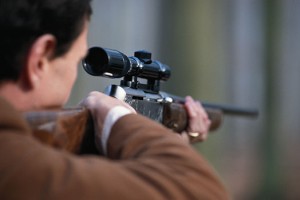 Among the hot-button items up for public comment to the Natural Resource Commission is a proposal to open Indiana deer hunting to high-powered rifles. Currently, Indiana limits modern day center fire ammunition in repeating and single shot rifles to selected “pistol” cartridges. The new proposal is sure to bring controversy even among deer hunters and outdoorsmen.
Among the hot-button items up for public comment to the Natural Resource Commission is a proposal to open Indiana deer hunting to high-powered rifles. Currently, Indiana limits modern day center fire ammunition in repeating and single shot rifles to selected “pistol” cartridges. The new proposal is sure to bring controversy even among deer hunters and outdoorsmen.
312 IAC 9-3-3 allows additional rifles to be used by reducing the bullet size required to .243 and eliminating the maximum rifle cartridge case length.
This will allow high-powered rifles such as the .30-30 and .45-70 during the deer firearms seasons. Full metal jacketed bullets would be unlawful since they do not expand when fired, and therefore, do not kill as humanely.
The DNR said it believes the change can be made now for several reasons, including:
- There are currently no limits on rifles that are legal to use for species other than migratory birds, deer and wild turkey.
- Muzzleloaders have evolved to the point that with muzzleloaders designed to use smokeless powder (which is legal to use), they are essentially a high-powered rifle (accurate 500-yard gun).
- They are legal in several nearby states, including Kentucky, Michigan (the northern part of the state) and Pennsylvania. There has been no increase in hunting-related accidents as the result of the use of rifles in other states where they are allowed.
Additionally, the proposal addresses legalizing the 28-gauge slug shotgun for deer hunting and includes wording permitting some rifle/handgun conversions:
Other proposal include:
- 312 IAC 9-3-12 that loosens the requirement of “landowner’s written permission” on the taking of coyotes.
It would low coyotes to be taken year-round without written permission of the landowner. Coyotes can be taken during the hunting and trapping season (Oct. 15-March 15) or year-round on private land with written permission of the landowner.
Removing the requirement for written permission would make it easier for individuals to remove nuisance coyotes at any time. Permission of the landowner or tenant would still be required, but it would not have to be in writing.
- 312 IAC 9-3-15 that removes some restrictions for nuisance animals.
The proposal makes several changes governing the following species of wild animals that are causing damage or causing a health or safety threat: raccoons, skunks, opossums, beavers, muskrats, red foxes, gray foxes, mink, long-tailed weasels, gray squirrels and fox squirrels.
Resident landowners and tenants would be allowed to designate another person (such as a relative, friend, neighbor or employee) in writing to take these animals for them outside the season and without a permit as long as there is no compensation of any kind.
Thousands of wild animals are a nuisance each year. They cause damage or threaten to cause damage to property or pose health or safety threat to people or domestic animals.
Taking the wild animal while it is damaging property is difficult. They need to be dealt with as quickly as possible without delays from having to wait to get a permit.
If approved, the changes would take effect in late summer or fall of 2015.
Individuals may submit comments about the proposals by visiting the Natural Resources Commission. Click on “comment on this rule” for the FW: Biennial Rule Amendment Package. Currently, there is no deadline for public comments. A final vote by the Natural Resources Commission on the proposed changes is not expected until May.
A public hearing has not yet been scheduled. More information will be available at a later date regarding the public hearing(s).
As for my thoughts on the high-powered rifle proposal … I feel it is a situation where “more” has now become too much!
Jack Spaulding is a state outdoors writer and a consumer of RushShelby Energy living along the Flatrock River in Moscow. Readers with questions or comments can write to him in care of Electric Consumer, P.O. Box 24517, Indianapolis, IN 46224; or email jackspaulding@hughes.net.



